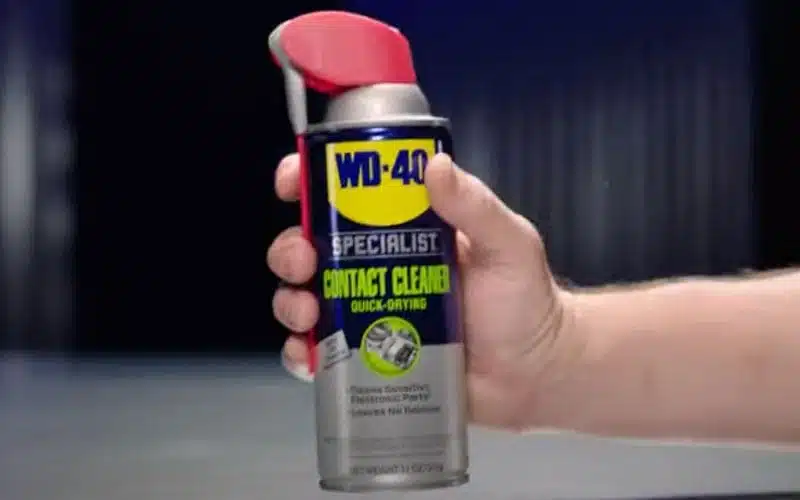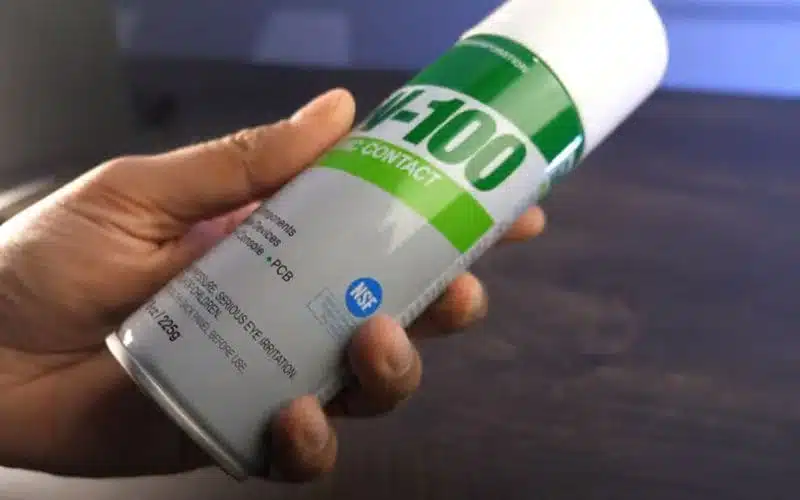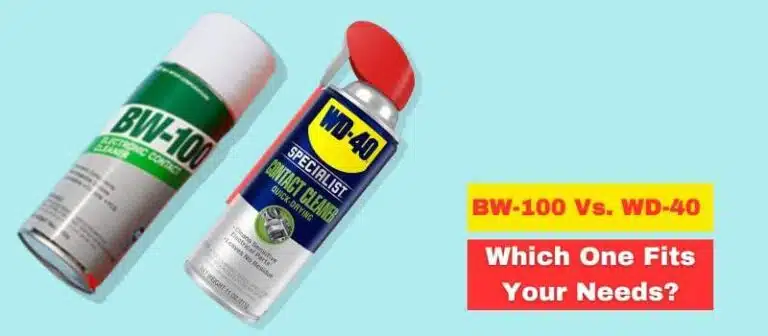Regarding lubricants and penetrating oils, BW-100 and WD-40 are two popular products that come to mind. But if you’re seeking differences, I have listed real-world differences between bw100 vs wd40 after thousands of hours of testing of both contact cleaners.
Both products are widely used for everything from loosening rusted parts to lubricating machinery. Both are similar products but have different strengths and excel in different areas. But The biggest advantage BW-100 has over WD-40 is its strong, cleaner power.
Related Read: 7 Best Electrical Contact Cleaner Spray (Top 7 Picks)
As such, in this blog post, I’ll explain the differences between BW-100 vs. WD-40, helping you decide which product best suits your needs.
BW-100 Vs WD-40: Product Comparision Table
Here is the comparison of crucial factors that need to be considered when evaluating which product may be better suited for your needs:
Which One Fits Your Needs?
BW-100 may be better when dealing with industrial lubrication, heavy machinery, and water or wet conditions vs WD-40. On the other hand, WD-40 provides an exceptional protective barrier for preventing rust on various household and general applications.
Ultimately, BW-100 and WD-40 Are better depending on your specific needs and type of application. WD-40 is commonly used in various household applications, and BW-100 is suitable for heavy-duty machinery. We’ve written about how to reduce your risk and limit your exposure.
WD-40 Contact Cleaner Review

The WD-40 contact cleaner is the best electrical contact for most people due to its precision targeting, ease of use, excellent performance, and fast-drying formula. The product is designed to remove oil, dirt, flux residue, and condensation.
It’s also safe to use on most plastics and sensitive electric equipment. If you need more preparation for extra investment, the WD-40 gives great performance for less money. It’s ideal for use on electronic circuit boards and electric panels. The WD-40 is easier to use than any other electrical contact cleaner.
As per my personal experience, WD-40 is the best electrical contact cleaner. It removes sensitive electrical equipment dirt, oil, and residue perfectly. When we tested WD-40, we found that its precision targeting is amazing. You can apply it easily in affected areas to specific problems.
Key Features
- It has effective cleaning capabilities.
- It evaporates rapidly without leaving residue behind.
- It helps to improve electrical conductivity.
The biggest downside of WD-40 is its strong and unpleasant chemical odour. So, to avoid inhaling issues, it is better to ensure adequate ventilation. Additionally, it is a flammable product in nature. I suggest carefully reading and following the Instruction Manual before use.
BW-100 Electronic Contact Cleaner Review

Non-flammable BW-100 Electronic Contact Cleaner makes it a fantastic contact cleaner that removes dirt and contaminants. We have tested residue-free Cleaning and found impressive results. It also can provide zero residue cleaning. We’ve also written about the best BW-100 alternatives to help you.
It’s a great basic design with user convenience and full peace of mind. You can use its wide range of electronic device applications for day-to-day use. BW-100 and WD-40 are fantastic, But if you are dealing with industrial machinery, BW-100 will be the ideal choice. I love BW-100 due to its gentle and residue-free Cleaning. BW-100 comes with a precise spray nozzle for keeping user convenience in mind.
Key Features
- Powerful cleaning without the risk of fire.
- It provides gentle and residue-free cleaning.
- BW-100 can have a wide range of electronic device applications.
If I discuss the pros and cons of it, I do not get more explanations here. It is an amazing go-to solution for cleaning up your electronic components. Few users face some residue concerns, but considering value for money, it is worth the investment.
What’s the Difference?
Here’s a comparison table based on common features:
| Feature | BW-100 | WD-40 Contact Cleaner |
|---|---|---|
| Purpose | Electrical contacts, | Electronic components, |
| switches, relays, etc. | connectors, etc. | |
| Cleaning Action | Removes dirt, grime, | Cleans and degreases, |
| oxidation, and residue | displaces moisture | |
| Compatibility | Safe for plastics, | Safe for most plastics, |
| rubber, and metal | rubber, and metal | |
| Drying Time | Fast drying | Fast drying |
| Residue | Leaves no residue | Leaves minimal residue |
| Non-Conductive | Typically non-conductive | Non-conductive |
| Flammable | May be flammable | Flammable |
| Packaging | Aerosol spray, liquid | Aerosol spray, liquid |
| Additional Features | Lubricating properties, | Multi-use formula with |
| corrosion protection | lubricating properties |
Determining which product, BW-100 or WD-40, is better depends on your unique requirements and the intended application. Here are some factors to consider before making final purchasing decisions
Application:
BW-100 is primarily designed for heavy-duty industrial machinery and equipment, offering high viscosity and excellent performance in extreme conditions.
WD-40 is a versatile multi-purpose solution suitable for various household and general applications. It has excellent cleaning properties with amazing penetrating power for corrosion protection.
Industrial vs. Household Use: Bw100 vs Wd40
BW-100 may be the better choice for industrial lubrication. If you are dealing with heavy machinery it is a perfect lubrication solution.
WD-40 is a versatile multi-purpose solution for general household tasks and small-scale various applications. It is very popular and commonly used where rust or moisture is a concern.
Environmental Factors: bw-100 vs wd-40
If your project involves exposure to water or wet conditions, I will recommend using BW-100. On the other hand, WD-40 also provides corrosion protection where moisture is a concern.
FAQ: bw-100 vs wd-40
Q #1) Is bw 100 the same as wd 40?
No, BW 100 and WD-40 are not the same product. BW 100 refers to an engine oil commonly used to provide lubrication and protection to the engine components. On the other hand, WD-40 is a multi-purpose spray lubricant used for various tasks, such as loosening rusted parts, preventing corrosion, and displacing moisture.
Q #2) What is the best cleaner for electrical connections?
The BW 40 spray is commonly used as an electrical contact cleaner and is widely recommended by experts. wd-40 is a highly effective solvent that can remove dirt, dust, and oil from electrical contacts and connections. It evaporates quickly, leaving no residue behind. However, I suggest caution and refer to the manufacturer’s instructions before using.
Q #3) What is the best cleaner for electrical terminals?
The Wd-40 is the best cleaner for electrical terminals. Cleanup may be needed to remove dirt, dust, and contaminants on Contacts terminals. The part I like best is that it evaporates quickly, leaving no residue behind.
How to use electrical contact cleaner spray – Video Tutorial
To use an electrical contact cleaner spray, follow these general steps shown in the video tutorial:
Conclusion: bw100 vs wd40
BW-100 vs. WD-40 are very popular and widely used in various activities to serve different purposes. It depends upon your needs and application when considering which product to use. Both are very similar products So it’s crucial to say which is better.
BW-100 offers an effective solution for industrial heavy machinery applications. On the other hand, WD-40 is a more versatile, general-purpose, reliable go-to product.
Understanding the distinctions between BW-100 and WD-40 will help you achieve optimal results in your maintenance and repair works.
Refrence Sources:
- www.chemtronics.com
- www.techspray.com
- www.mgchemicals.com
- www.crcindustries.com
- www.permatex.com
- www.kontaktchemie.com
- www.deoxit.com
- www.caig.com
- www.rs-online.com
- www.digikey.com
Related Article:
